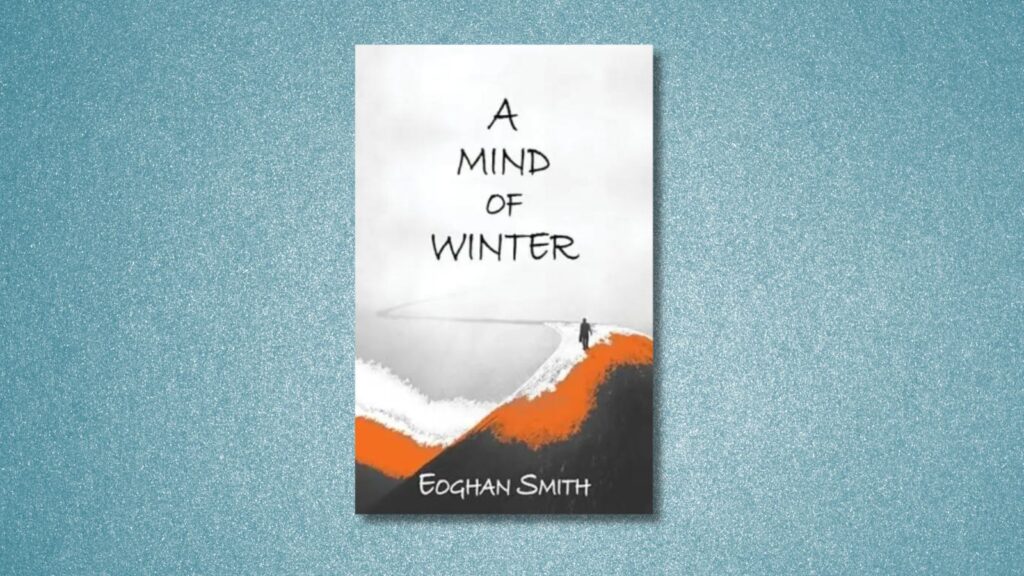
A Mind of Winter|Eoghan Smith|Dedalus Books
A bleakly humorous, philosophical, and inescapably human story—Niall McArdle on A Mind of Winter, by Eoghan Smith
by Niall McArdle
“There was love, or was it death, in my heart, or maybe it was both, it is sometimes hard to tell the difference.”
It takes serious chutzpah for a writer, especially an Irish writer, to begin their novel with prose that echoes the closing passage of James Joyce’s “The Dead”, but that is how Eoghan Smith begins his blackly comic, melancholy, existential novel A Mind of Winter. It is apt, though, as this is a particularly death-haunted novel. Fox, the protagonist, who has fallen in the snow and can’t get up, contemplates his own end and all the deaths he has encountered: his parents, his childhood pets, even “the insect lives I have needlessly, accidentally, mercilessly extinguished. I imagine they must number in the hundreds, perhaps even the thousands. Quite the killer I have been, quite the corpse-accumulator.” He wishes to get these deaths mentioned early, “all the deaths placed neatly at the beginning, let’s get them out of the way so we can concentrate on the living,” but as the novel progresses, this is easier said than done.
Fox, the protagonist, who has fallen in the snow and can’t get up, contemplates his own end and all the deaths he has encountered
Snow falls, in Joyce’s story, upon the living and the dead, but here it also falls on the soon-to-be-dead: namely, Stoyte, an academic, in whose mind “snow has been falling all winter.” Stoyte was once Fox’s mentor; he is also husband to Clara, Fox’s one-time lover. Fox sets out one bitterly cold January morning to visit Stoyte on his deathbed as Clara has called to say that Stoyte wants to tell him something important before he dies. Is Stoyte named for Stoyte House in Maynooth University, where Smith once taught, or is he thinking of the character Stoyte in Aldous Huxley’s After Many a Summer? That particular Stoyte was obsessed with death and attempted to defeat it. The name Fox, too, of course, has resonance: foxes are solitary, nocturnal hunters, and Fox is a loner, holed up in a cottage where he is supposed to be finishing a book. And like a fox might, at one point he kills a sheep, albeit accidentally.
The novel’s title comes from Wallace Stevens‘s “The Snow Man” and the poem provides the book’s epigraph: “For the listener, who listens in the snow,/And, nothing himself, beholds/Nothing that is not there and the nothing that is.” The perspective of the narrative is Fox’s, although frequently it will shift to second-person and occasionally the scene will be told by an omniscient narrator, as in a film when we zoom out from a character to reveal just how alone he is in a vast landscape. It’s not clear if it’s strictly an omniscient narrator or if it is simply Fox imagining how he must look from a distance.
Smith was partly inspired by a photograph of the corpse of Swiss writer Robert Walser, who was found dead in the snow, his hat a few feet away, in circumstances very similar to Fox. Fox, has in fact, foreseen his own end, having studied “innumerable photographs of dead men lying face up in the snow … I have traced with my fingertips across the shimmering screen the slump of their frozen bodies, the crook of their necks, the vacancy of their faces.”
In A Mind of Winter Fox is unable to forget his past, “to lie beneath each cold drop of memory until you become encased in ice.”
Fox, who tells us “I have an instinct for all things substantial” lies on his back, his beloved homburg hat a few feet away, wondering how he managed to end up here. “Think,” he exhorts himself, “and if you can’t think, invent.” There is a lot of inventing, then, and we are not sure how much we can trust Fox’s version of things. As he tells us, “to strive for a perfect delineation of reality is to pursue a form of madness.” Smith’s previous novel, A Provincial Death, had a similar set-up: a doomed figure isolated in a natural setting ruminating on the mistakes of the past and facing an inevitable future. In A Mind of Winter Fox is unable to forget his past, “to lie beneath each cold drop of memory until you become encased in ice.”
Perhaps this is why Fox has such trouble with time, not just with keeping track of it, but with the concept. “I feel time is draining away, that we will soon reach the end, but at the same time that we have made no headway, that we are characters trapped forever in a novel, manipulated, our agency a delusion, a demeaning lie, and there is nothing that can be done about it. Each second we spend here is a second that disappears, remorselessly.” He throws away his clock, “the most hateful thing I owned,” and even then there is vacillation, “for there has always been a tussle in my head between the me that cannot bear the ticking of the clock and the me that wishes to see each second devoured.”
At just under a hundred pages, A Mind in Winter can be read in a couple of hours, but you may want to take your time with it to relish Smith’s style
The disposal of the clock is part of Fox’s decluttering of the cottage, or better said, decluttering of his creativity. He destroys his piano and the “other scatterings of my meagre artistry” including paintings he has made. He also throws out his books and bric-a-brac, souvenirs, photos, and “other minor vestiges of my former lives.” He considers smashing up the cottage’s floorboards and digging a hole – a foxhole? – to climb in and never come out but acknowledges that “you still need solid ground, something to stand on, you are not independent of the earth, not yet.” But in spite of this action, he is unable to stop imagining: “Don’t make things up. There has been too much of that already.”
At just under a hundred pages, A Mind in Winter can be read in a couple of hours, but you may want to take your time with it to relish Smith’s style. Each brief chapter is made up of a single, uninterrupted paragraph that can go on for pages and pages, broken by a command: “Up, Fox, up. Up”. The prose is unadorned for the most part although occasionally Smith slips in a Banvillean image like “the slate sky was casting its shadow everywhere, and everything was dimming in the subfuscous light.” Smith employs long, multi-clause sentences and repetition of phrases: “Perhaps if I could get to my feet, perhaps if I could lurch a little further, perhaps if I could find my way to edge of the field, perhaps if I could find the gap in the hedge, perhaps if I could find the road again, perhaps if I could walk the road …”. Smith’s method is echoed in the obscure, niche topic of Stoyte’s academic project, which Fox and Clara also worked on: “identifying the authorship of recently rediscovered early modern Irish scholia,” involving “examining the minutiae … of word frequencies, of colours, lines and curves, of the structures and sizes of letterings, considering the gaps in the scripts and spaces on the pages, of quantites, of repetitions, of occurrences.”
There is a lot of perhaps in the novel. Certainty or the lack of it occupies Fox’s mind, and there is a great deal of ambiguity, both psychological and linguistic. “Should I have committed myself to the future perfect?” Fox asks. In A Mind of Winter, Smith has fashioned a bleakly humorous, philosophical, and inescapably human story.












